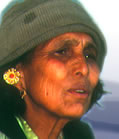THEMES IN THIS
TESTIMONY
Agriculture

Communications

Conflict

Development

Politics

Social Relationships

Click on arrows
to find more
testimonies
featuring
these themes
|
|
Sex
|
female
|
|
|
Age
|
50s
|
|
|
Identity
|
N
|
|
|
Occupation
|
farmer
|
|
|
Location
|
Nuwakot district
|
|
|
Date
|
2002
|
|
summary
Durga gives a vivid personal account of the situation in Nuwakot where village communities live under constant strain and stress from both Maoist insurgents and the Nepalese army. By day the army roams around, searches people at numerous checkpoints and arrests villagers thought to be Maoist supporters. “I am scared to even visit or to do anything… The army checks five, six times on the way to Kathmandu… These days they ask us to get off the bus. They ask to see our bags… a few days ago they even made everyone untie their hair just to make sure that women were not hiding anything under their buns.” At night the Maoists come to the village and shout slogans: “…they yell all night long, don’t know what all they say. They shout at the tops of their voices, ‘Fulfil our demands’, and the like…”
The conflict has affected Durga directly. One of her sons-in-law has been hospitalised – and seems to have been at least temporarily paralysed – after Maoist rebels beat him up with a hammer. Another was arrested by the army as a suspected Maoist sympathiser, detained for several days and beaten. Durga says she knows of no reason why either of them was targeted. She fears greatly for her three teenage sons; she knows how often villagers get caught up in the two sides’ attacks and counter-attacks.
Her story graphically illustrates how the conflict affects the rural poor, reversing their hard-won development gains. She says Maoists have destroyed much of the local infrastructure, including telephone communications. Schools have to close at times. People live in an atmosphere of fear and the authorities provide no protection or security: “What sort of security could be said to have been given? They come in a swarm and go away soon after. They come first and the Maoists follow right behind them.” The women’s cooperative collapsed after Maoists broke up a recent meeting and subsequently burnt their building. Before this happened, Durga had used a loan to buy and raise goats and chickens. She comments ruefully, “Perhaps, if we had continued to build on it, we could have done something… Starting off small, maybe it would have grown big… We had a chance to make some progress. Even that is gone now.”
detailed breakdown
|
You will need a password from Panos to view the full
transcript of the interview. To apply for a password, click here.
Once you have a password, click here to go to the beginning
of the transcript. You can also click on any section of the
breakdown of content below and go straight to the
corresponding part of the transcript.
|
| Section Section 1-2 |
Doesn’t know how old she is. “They say my mother died when I was very young. Who will tell my age now?” Thinks she’s about 50.
Married at 16-17; six children; sons still at school, daughters married.
Feels that people generally are “comfortable” nowadays, but says “I myself have no comfort.”
Young generation still farm. Crops grown: “Of course, they are the same maize and millet. Now they’ve added wheat, mustard and paddy” because of irrigation, which they put in themselves. They get good yields, twice a year. But she has v little land of her own.
|
| Section Section 2-4 |
Maoist insurgency: “…some say there are killings, some say something else. Some say they plunder. They’ve caused so much trouble.”
Son-in-law “taken” by the army (later released); she doesn’t know whether he had joined the Maoists.
Maoist activity often results in temporary closure of schools.
She says the rebels have not harassed women.
A major problem is the destruction of buildings and infrastructure. Telephone line cut and not likely to be restored for 5 years. “Now, not having a telephone is like having a broken limb.”
Atmosphere of fear. “Many people in the village, the ones lower down, are being raided.”
Army checkpoints and searches of bus passengers.
“Since I am uneducated, I am even more scared - it’s like that. It’s not about being scared of dying [myself]. I’m only afraid that my sons may die or that they will be taken by the Maoists or the police. I only have them to depend on.” Says “there is no husband” but doesn’t elaborate.
|
| Section Section 5-7 |
Sons help her in the home and in the fields. In some ways improved farming methods have increased women’s workload: “These days, winter crops, summer crops - you don’t run out of work.”
The women’s savings cooperative has disbanded since the Maoists broke up a meeting, pasted posters banning meetings and burnt down the cooperative building. “Since then even the person from the PDDP office (UNDP’s Participatory District Development Programme), who conducts the meeting, hasn’t come.”
Before, she borrowed Rs 5,000 through the co-op. Describes deposit and loan cycle; with her loan she “bought and raised goats, bought chickens and reared them”.
|
| Section 7 |
Doesn’t know whether the cooperative will be revived. Some people have left the village.
“There are fears that…[the Maoists] just might take control. If that happens, people will stop farming, isn’t it? Of course, it is not possible to stop. After all, one has to eat. Farming will have to be done even if we are afraid.”
In other places Maoists have taken grain from villagers as well as cash (other narrators mention this), though this has not yet happened to them. The regular army is in the surrounding area. “Whoever catches the other first will kill the other, I suppose.”
|
| Section 8 |
No protection from police or army despite promises. “That’s just talk… they haven’t gone to protect villages. It’s just once or twice they came, quickly arrested many people and took them away. And then, the Maoists walk around the whole night, shouting slogans.”
Arrests and detentions. Her son-in-law was released after “a number of days” but was beaten in detention. “My son-in-law is walking around, but the village teacher was beaten severely. They say he was beaten so badly, he can’t even stand on his feet. Now, there is no teacher to teach in the school.”
Before, “Everyone in the village was like a brother or sister”; now conflict is rife.
|
| Section Section 9-10 |
Asked why she thinks the Maoists have come, she says, “It isn’t that oppression has increased. Maybe they feel that they could treat the public in that manner if they could also live like that. Perhaps they want to better their lot, live in comfort. The Maoists want to establish their own authority, I suppose.”
Describes bombing of telephone exchange.
Maoists not in evidence during the day. “They go around carrying torches and shouting slogans at night. We shouldn’t step out of the house at night, we’re told. What do I know?”
|
| Section Section 10-11 |
Says Maoists “want to do away with the King”. Feels dubious about what they would do if they gained power, given their record to date. “Well, what will these people [create]? They completely destroy what has already been built.”
Her other son-in-law “is in Kathmandu hospital after the Maoists broke his limbs. He still can’t move his hands and feet. They haven’t let his family live in peace in the village either, beating and chasing them.” His children were hounded out of his wife’s maternal home, too.
She doesn’t understand why the (first) son-in-law, mentioned earlier, was picked up by the army. “Poor chap, what politics would he do? He would just plough and live. He isn’t educated; what kind of politics he would do?”
Talks about the trauma experienced by his daughter and grandchildren when he was arrested. “There was gaiety only when he was finally released and returned home.” |
|


